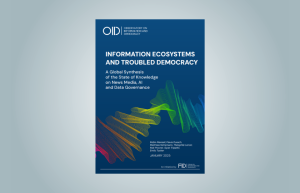Do information ecosystems weaken democracy and promote the viral spread of mis- and disinformation? In the report “Information Ecosystems and Troubled Democracy: A Global Synthesis of the State of Knowledge on New Media, AI and Data Governance”, Prof. Dr. Matthias C. Kettemann, Prof. Dr. Robin E. Mansell, Dr. Flavia Durach, Théophile Lenoir, Prof. Dr. Rob Procter, Gyan Tripathi and Emily Tucker assess the role of various actors in the information ecosystem.
 The report provides a critical overview of the current state of research in three areas with the cross-cutting theme of misinformation and disinformation:
The report provides a critical overview of the current state of research in three areas with the cross-cutting theme of misinformation and disinformation:
- media, politics and trust,
- artificial intelligence, information ecosystems democracy,
- and data governance and democracy.
It highlights the insights that can be gained from groundbreaking research in these areas.
It also includes three short summaries aimed at policymakers, technical stakeholders and researchers, as well as an interactive bibliography of more than 3,000 sources, that can be searched by topic, region, date and author. An illustrated dynamic map shows the thematic connections.
You can download the report here (pdf)
Key Findings
1. Holistic Perspective on Information Ecosystems
The report emphasizes the interdependence of people, practices, values, institutions and technologies in specific social, cultural and political contexts. Misinformation is seen both as a symptom and as an amplifier of societal changes, rather than as a problem that alone weighs on democracy.
2. Thematic Insights
- Human rights and fundamental freedoms: distinction between universal principles and their practical application.
- Big tech and data governance: criticism of models of data monetization that undermine a pluralistic public sphere and enable the instrumentalization of information.
- Discrimination in information ecosystems: Addressing the fact that algorithmic adjustments are not able to eliminate systemic inequalities that affect marginalized groups.
- Media and AI literacy: These are important, but on their own cannot effectively combat misinformation.
3. Challenges and research gaps
- A significant Eurocentric bias in research requires efforts at decolonization.
- Limited studies on structural and institutional power dynamics compared to studies on individual behavior or the microeconomics of the market.
- Insufficient access to big tech data, inconsistent definitions across studies, and politicization of research.
4. Critical observations
- Disinformation research should examine power infrastructures, not just technological effects on information integrity.
- Media trust is influenced by various factors that go beyond algorithms.
- Weaknesses in polarization research, which is very much focused on the Global North and on limited platforms.
5. Environmental and Ethical Considerations in AI
There is a need to highlight the energy-intensive processes of AI and to address prejudice and discrimination within AI systems, rather than relying solely on narratives of “trustworthy AI”.
Mansell, R., Durach, F., Kettemann, M., Lenoir, T., Procter, R., Tripathi, G., and Tucker, E. (2025): Information Ecosystems and Troubled Democracy: A Global Synthesis of the State of Knowledge on New Media, AI and Data Governance. International Observatory on Information and Democracy. Paris. https://observatory.informationdemocracy.org/wp-content/uploads/2025/06/rapport_forum_information_democracy_2025-1.pdf.

